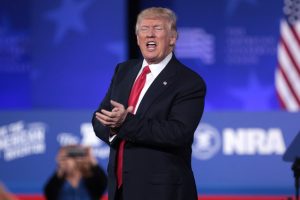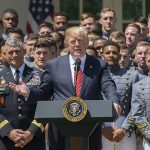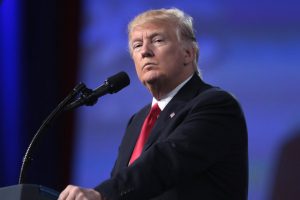by Eli Clifton
Over the weekend, Donald Trump hit back at Khizr and Ghazala Khan, the parents of Muslim Army captain Humayun Khan, who died in Iraq in 2004. Their crime? Khizr Khan told the Democratic National Convention audience that Trump may not have read the Constitution, that Trump’s proposed ban on Muslim immigration would have barred his family from entering the United States, and that Trump “sacrificed nothing” for his country.
Trump shot back, implying (inaccurately) that Ghazala Khan was forbidden from speaking at the Convention because she is a Muslim woman. He also claimed that Khizr Khan had “no right” to question his familiarity with the Constitution and asserted that he had made sacrifices for his country by employing “thousands and thousands of people.”
Khizr Khan followed up on Sunday, saying, Trump “is a black soul, and this is totally unfit for the leadership of this country.”
The feud with the Khans has quickly turned into a character test for Donald Trump and his supporters. Interestingly, Trump laid out his own set of character requirements for a president back in 2008, on his now deleted Trump University blog. A cached copy was stored on Archive.org.
Give and Take with Goodwin
Trump added his own notations to a list of “ten points that are important for a President and consider and to emulate if they hoped to be great” that apparently originated with an article written by Pulitzer Prize Winner Doris Kearns Goodwin. Her list “made a lot of sense to me,” according to Trump.
The ten attributes are: “The courage to stay strong;” “Self-confidence;” “An ability to learn from errors;” “A willingness to change;” “Emotional intelligence;” “Self-control;” “A popular touch;” “A moral compass;” “A capacity to relax;” and “A gift for inspiring others.”
[UPDATE: Trump appears to conflate Franklin Delano Roosevelt and Abraham Lincoln in his first example of a presidential leadership strength. Lincoln “dealt with poverty and polio and was able to lead this country at a tremendously difficult time in history,” said Trump. There is no record of Lincoln suffering from polio.]
Readers can use their own judgement to assess whether Trump passes or fails his own test for presidential leadership. But Doris Kearns Goodwin appears to have already passed her verdict.
Appearing on Meet The Press this Sunday, Goodwin told Alex Castellanos, a Trump Super PAC advisor:
You know what, Alex? I do think this is a moment that will be remembered. I think it’s almost a moment like using your word “decency,” when Joe Welsh said to Joe McCarthy, “Have you no decency?” Somehow, you have a powerful story told by a man and the candidate somehow is able to look at the wife and say, “Why didn’t she say anything? Was she told not to say anything?” I had a son in combat almost the same time as this young soldier was killed. I don’t know what I’d be able to do if he had been lost and I’m standing there behind his picture. How you can assume that that kind of temperamental quality is going to be able to understand other people’s points of view– I think he stood as a symbol of pride for Muslim-Americans.
I’ve always predicted “a bridge too far” when he said that John McCain wasn’t a hero, I thought that was it. So maybe everything’s topsy turvy this year, but I agree with David [Brooks]. Elections are topsy turvy, this is going to make a difference.
Goodwin later went on to compare Trump unfavorably to Franklin Delano Roosevelt and Abraham Lincoln, saying:
I mean, once again, it shows the question of temperament. When he says that “I have a winning temperament because I’ve won my whole life,” he doesn’t understand what temperament is. Our greatest leaders have succeeded because they learned from failure and they learned from loss. Abraham Lincoln was nearly suicidal and he persevered and came back.
Trump would probably call him weak for almost giving up. FDR lost his ability to walk and he came back with greater empathy and understanding for people for whom fate had dealt an unkind hand. You learn from making mistakes. You manage negative emotions, as you said. You learn somehow to listen, you have empathy for people. That’s qualities that make up temperament. So I think this race is about temperament. I absolutely do.
Trump’s Ten
Trump’s 2008 blog post is reprinted below.
I read an article recently that made a lot of sense to me. Doris Kearns Goodwin is a Pulitzer Prize winner for her books on history, and she made a list of ten points that are important for a President to consider and to emulate if they hoped to be great. She has written books about Abraham Lincoln and Franklin and Eleanor Roosevelt, and she believes leadership strengths should be considered carefully before voting. Here are some of the attributes that she feels make for a great leader–and I agree!
- The courage to stay strong.
This means a President needs to be able to withstand adversity. Lincoln is a terrific example, as he dealt with poverty and polio and was able to lead this country at a tremendously difficult time in history.
- Self-confidence
Lincoln surrounded himself with people of differing perspectives who would disagree with him and say so. Self confidence doesn’t require yes men and women as advisors.
- An ability to learn from errors
The first step is to acknowledge an error and the second is to effectively move forward. Both Lincoln and FDR were able to do this. When FDR’s program didn’t work as he had planned, he created a new one in its place, learning from the mistakes he’d made.
- A willingness to change
FDR incurred the wrath of industrials during his New Deal, but when war came, he made peace with them, knowing their commitment was necessary for a victory.
- Emotional intelligence
Both Lincoln and FDR shared credit for successes, and FDR had a gift of making others feel confident they could do their best.
- Self control
Leaders can manage their emotions and remain objective and productive in times of calamity. When Pearl Harbor was attacked, FDR remained calm, absorbing the news while deciding what to do. Lincoln had the habit of writing a ‘hot letter’ when he was angry, putting it aside, and never sending it.
- A popular touch
The best Presidents appear to have an intuitive sense of what the public wants or needs to hear. FDR held his ‘fireside chats’ but only when he felt the timing was right.
- A moral compass
Lincoln was warned that if he didn’t renounce emancipation, he would have no chance of re-election. He said, “I should be damned in time and in eternity” if he chose to turn his back on the slaves to whom he had pledged freedom. He turned his party’s leaders away and the rest is history.
- A capacity to relax
Both FDR and Lincoln knew the importance of laughter. Lincoln had a good sense of humor and told long tales, and FDR had an evening cocktail hour at the White House with two rules: Politics and war could not be discussed.
- A gift for inspiring others
FDR’s first inaugural address was at the height of the Depression, yet his deep confidence in his country gave new hope to millions of people. His communication skills were remarkable, as were Lincoln’s. They both shared a love and knowledge of poetry and drama, and used that knowledge effectively. They knew how to educate the public while inspiring them.
Photo of Doris Kearns Goodwin courtesy of LBJ Library via Flickr.






Khan is using his dead son as a prop to support warmongering Hillary Clinton who voted to send Khan’s son to a unnecessary war. Khan asks what did Trump sacrifice? Was his script written by the DNC? Did he also ask Hillary the same question? Well Trump is not running against Khan, What did Hillary sacrifice except other people’s children in her push for war in Iraq, Libya and Syria.
I’ve always predicted “a bridge too far” when he said that John McCain wasn’t a hero, I thought that was it. –Goodwin
Really? That from a “historian”. Has she ever heard of the John “Tokyo Rose” McCain? McCain was a collaborator and certainly is not a hero. Goodwin’s book Team of Rivals gave Obama a good excuse to fill his administration with Wall Street lobbyists (too many to name), financial fraudsters (Penny Pritzker), warmongers (Hillary) and incompetent neoliberal economists (Larry Summers), which proved disastrous to the American people.
The elite in the Washington bubble have a full court press to insure that Hillary gets the presidency that she “deserves” so the status quo is maintained. Outliers like Sanders and Trump must be demonized so the power structure and deep state is not disturbed.